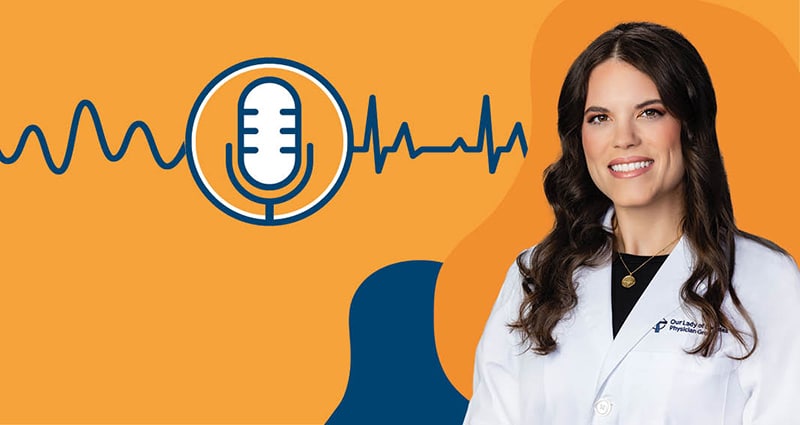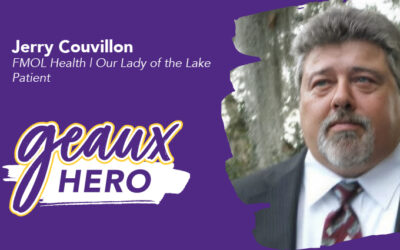Your primary care provider is more than just a healthcare professional — they can become your health’s best friend, guiding you every step of your healthcare journey.
Katie Doggett, NP, joined shares insights about primary care, which she provides primary care at Our Lady of Lourdes Physician Group Family Medicine practice in Sunset, Louisiana, near where she grew up in Carencro.
Who Needs Primary Care? You do!
Primary care isn’t just about treating illnesses, it’s about fostering a lasting partnership focused on proactive health management.
“Primary care is where you can establish that relationship,” Doggett says. This continuity of care ensures a more personalized approach.
Doggett stresses that you don’t need to be sick to benefit from regular primary care.
“You see a PCP to help you manage your health, not only to care for you when you are acutely or chronically ill, but also to prevent illnesses and improve health,” she says. “Just because you don’t have any symptoms doesn’t mean you aren’t sick. With annual wellness screenings, PCPs can help identify and address disease processes earlier.”
The First Step is Easy
Getting established with a primary care provider can be simple, especially with the easy access tools our health system provides.
“Don’t be intimidated! It’s easier than you think,” Doggett says. New patients can schedule online or call. In Acadiana, Our Lady of Lourdes offers locations throughout the nine-parish region, so patients are never far from the care they need.
Set the Stage for Personalized Care
Doggett says she approaches first visits with patients as “planning sessions” focusing on collaborative decision-making.
“We kind of say, OK, where are we going to go from here? What’s our next step? What else can we work on?”
In addition to coming prepared with a list of questions and concerns, Doggett also suggests you bring your medical records and any medications and supplements you may take, even vitamins.
Bring the actual bottles, so the primary care provider can see the types and dosages of each. “Sometimes those supplements interact with other medicines,” she explains.
The Power of Personal Connection
Doggett works to foster deep connections with her patients, which includes listening carefully to them and jotting down notes during visits.
“Being in that room and listening to my patients is my favorite part of the day,” Doggett says. “I truly care about them and want to help them. We discuss their care options and come up with a plan together.”
This approach enriches her provider-patient relationships. She also hopes that works both ways so her patients stay in touch and provide feedback.
“When they leave, I tell them to please let me know if you are not getting better. I do not know if you do not tell me,” Doggett says. That type of two-way communication supports better health outcomes.
Once you’re connected with a provider, communicating has never been easier thanks to MyChart.
“MyChart is a big way that patients can get very active in their own healthcare,” Doggett says. You can feel empowered to take control of your health and have access to someone who knows your history.
“I want you to contact me. I’d rather squeeze you in or do a video visit instead of you having to go to an urgent care,” Doggett says. This flexibility enhances accessibility and convenience for patients.
Why Primary Care as a Career
Doggett began her healthcare career as a registered nurse and worked in several roles across Our Lady of Lourdes Health over 11 years, including in progressive and intensive care units.
“Working in the ICU, I cared for a variety of patient situations, some of which could have been prevented had they had better access to care,” Doggett says. “That’s why I wanted to work in family medicine and primary care. It’s what made me say ‘I want to get to them before they get to this point.’”
The Appeal of Family Medicine
Rural communities benefit from a family medicine model, Doggett says, which becomes a great resource for outlying areas.
“The whole family can go, and you can be seen across your lifespan, so it’s really convenient,” she explains. “It can be difficult to go into town during a busy work week or school week, and having that access in a rural community is huge.”
From managing colds to offering comprehensive wellness visits, Doggett notes, this type of care caters to the diverse needs of families and helps ensure healthcare is more accessible.
Importance of Preventive Care, On a Personal Note
Having an established relationship with a primary care provider, Doggett shares, could have helped her own father discover an illness sooner and prevent its progression.
“My dad believed he didn’t need to go to the doctor because he wasn’t sick,” she says. When her father eventually sought medical attention for shoulder pain, he was diagnosed with hypertension.
“Our job is to prevent you from getting to that point where you become symptomatic,” Doggett says.
Prevention includes regular annual wellness screenings as well as mood-follow ups, which are a lesser-known aspect of primary care. A provider can help manage medications for conditions like anxiety, depression and ADHD. The comprehensive approach of primary care addresses not only physical but also mental health concerns.




